
‘TASERS can kill, and they are disproportionately used against people of colour,’ Rosalind Comyn of campaign group Liberty said yesterday.
She was responding to Tory Home Secretary Priti Patel’s announcement that she has approved a new Taser for police to fire which is twice as powerful, has a better ‘hit rate’ and induces more pain than the current model.
Comyn said: ‘Rather than continuing to promote more aggressive and dangerous police tactics, the government should focus on tackling police racism and finding solutions that actually keep our communities safe.’
Patel has approved the use of the Taser 7, an upgraded model of the weapon that will enable police to use it at distances of up to 22 feet from the person targeted. The standard police issue Taser deploys 50,000 volts. The Taser 7 when deployed discharges 100,000 volts.
According to Amnesty International, 18 people in the UK have died after a Taser was discharged against them by police since the weapons were introduced 16 years ago.
In one such case, retired international football star Dalian Atkinson died on 15 August 2016 after being tasered by police near his father’s house in Telford.
Axon, the US company which manufactures it, claims the Taser 7 is faster, more accurate, and has ‘stronger connections’ when the electrically-charged darts hit a suspect. They are also better at penetrating clothing.
The approval follows a £10 million government cash injection to treble the number of frontline police officers trained in their use, from the current 20 per cent level.
Police deployed Tasers a record 23,000 times last year, double the number just two years ago, Home Office figures show.
Meanwhile Stop and Searches in London rose by 40% during lockdown, and a lower proportion of them led to arrests, figures show.
The tactic was used 104,914 times between April and June, equating to more than 1,100 times a day.
The statistics have prompted renewed concerns that police are using the power indiscriminately.
Maurice Mcleod, chief executive of Race On The Agenda (Rota), said: ‘These latest statistics are worrying. They show that as reported crime fell during lockdown, police officers have had more time to work proactively and that this proactive work seems to have resulted in a huge spike in stops.
‘The increased proportion of stops that result in no action suggests that stops are being carried out based on officers’ pre-existing biases rather than on genuine suspicion of criminality.
‘As lockdown regulations ease, there is a real risk that the increasingly disproportionate use of these powers will further damage relations between the police and some of London’s communities.’